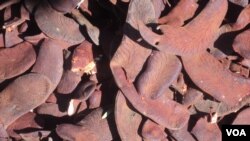MUTARE —
A local tree which normally grows in dry regions has become the engine of agriculture growth in Penhalonga, Manicaland province, as it is being used to boost dairy and beef production.
Smallholder farmers say the use of indigenous knowledge is finally paying dividends in an area where beef and dairy production is largely confined to subsistence farming.
For smallholder dairy and beef producer, Joyce Gombe, who is also the principal of Forestry Industry Training College, innovation on cattle feed is paying dividends.
Ms. Gombe says the use of the Masekesa tree, which produces highly nutritious pod-like fruits, is helping in boosting milk production for dairy farmers.
She says the Masekesa tree is equally a big supplement for commercial stock feed readily available in Zimbabwe.
The Zimbabwe College of Forestry principal says she has seen a marked difference in the past three seasons when she began feeding her cattle with the Masekesa pods.
She says the pods are ground and fed to the cattle, adding that beasts show a marked change within weeks of being fed on the locally-made stock feed.
The tree is found mostly in natural region 5 where there is less rainfall and is found in most parts of Zimbabwe has a high protein content.
She says this project could be implemented countrwide to boost beef and milk production among smallholder farmers.
Forestry college student Emmanuel Tarwireyi, who is working on research for the Masekesa Stockfeed Project, says the indigenous product helps in a great way in ensuring that calves are saved from early death and in increasing soil fertility. Tarwireyi said the product is also good for humans as it suppresses most viral ailments.
Tarwireyi is set to travel Wednesday to Nairobi, Kenya, for a presentation on the new Masekesa Stockfeed project at the Agribusiness Education Fair at the World Agroforestry Centre in that country.
The fair is being organized by the African Network for Agriculture, Agroforestry and Natural Resources Education in conjunction with the Forum for Agricultural Research in Africa, the Technical Centre for Agricultural and Rural Cooperation, Pan-African Agribusiness Consortium and the Association of African Business Schools.
The objective of the fair is to improve agribusiness teaching and research through stronger linkages of training institutions with business and private sectors.
Smallholder farmers say the use of indigenous knowledge is finally paying dividends in an area where beef and dairy production is largely confined to subsistence farming.
For smallholder dairy and beef producer, Joyce Gombe, who is also the principal of Forestry Industry Training College, innovation on cattle feed is paying dividends.
Ms. Gombe says the use of the Masekesa tree, which produces highly nutritious pod-like fruits, is helping in boosting milk production for dairy farmers.
She says the Masekesa tree is equally a big supplement for commercial stock feed readily available in Zimbabwe.
The Zimbabwe College of Forestry principal says she has seen a marked difference in the past three seasons when she began feeding her cattle with the Masekesa pods.
She says the pods are ground and fed to the cattle, adding that beasts show a marked change within weeks of being fed on the locally-made stock feed.
The tree is found mostly in natural region 5 where there is less rainfall and is found in most parts of Zimbabwe has a high protein content.
She says this project could be implemented countrwide to boost beef and milk production among smallholder farmers.
Forestry college student Emmanuel Tarwireyi, who is working on research for the Masekesa Stockfeed Project, says the indigenous product helps in a great way in ensuring that calves are saved from early death and in increasing soil fertility. Tarwireyi said the product is also good for humans as it suppresses most viral ailments.
Tarwireyi is set to travel Wednesday to Nairobi, Kenya, for a presentation on the new Masekesa Stockfeed project at the Agribusiness Education Fair at the World Agroforestry Centre in that country.
The fair is being organized by the African Network for Agriculture, Agroforestry and Natural Resources Education in conjunction with the Forum for Agricultural Research in Africa, the Technical Centre for Agricultural and Rural Cooperation, Pan-African Agribusiness Consortium and the Association of African Business Schools.
The objective of the fair is to improve agribusiness teaching and research through stronger linkages of training institutions with business and private sectors.










